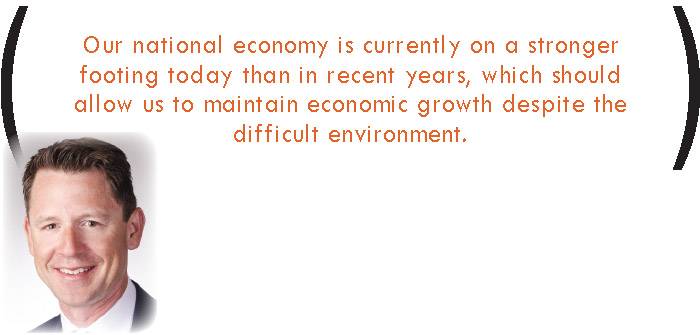The last few months have certainly given all of us plenty to think about. High volatility in global financial markets, the Federal Reserve’s interest rate increase, uncertainty over China’s output, the plunge in oil and the significant corrections in U.S. equity markets have all given rise to the question of whether or not the U.S. is headed into a recession in 2016.
Economic forecasts are, by their nature, extremely difficult puzzles to solve, with success rates generally worse than weather forecasters combined with what are usually much greater stakes. It has been said that analysis of equity market movements have predicted nine of the last five recessions, so we must use caution when drawing conclusions from any data or analysis.
Below are a few of the key issues that are shaping our outlook for 2016.
The Fed — We heard a great deal over the last 12 months about the “end of the Fed’s easy money” and what impact that would have on the economy. The Fed did proceed in December with its first increase to its target overnight rate in more than nine years. Despite the initial increase (and a few more are expected to be added during 2016), the Fed’s current monetary policy still must be described as very accommodative to econom-
ic activity.
We are currently below the 60 year low (prior to the recession of 2007) for the target rate and it would take more than two Fed increases to bring the overnight funds target up to the 1.0 percent level that was in place in 2004 when the Fed last began a cycle of increases. Further, the Fed still holds $3.5 trillion in securities on its balance sheet (which keeps extra cash roughly equal to the entire economy of Germany in the U.S. economy) and has announced no plans to reduce these holdings any time soon.
China — China is facing the reality that their recent growth pace is not sustainable, but this is far from a crisis. China is undergoing a transition from an export based economy to more of an internal consumption economy. The bigger the ship, the longer it takes to turn. Suffice to say that China is a pretty big ship. Thus, this transformation will take a long time, and in the interim, speculative reactions by investors will continue to create heightened volatility in global markets. Changes in China’s growth have limited direct effects on the U.S. economy but there will be numerous small indirect effects (principally via Europe) that will be of significance during 2016 and beyond. These effects on a net basis are not expected to be large enough to drive the U.S. economy into recession.
Oil — Continued low oil prices have had and will continue to have real impact on regional areas in the U.S. that benefited from the recent boom in prices and production. Overall, long term economic impact of continued low oil prices, however, is generally expected to be beneficial for U.S. consumers and businesses. This is a good thing because oil prices are unlikely to be returning anywhere near $100 per barrel anytime soon. Active rig counts in the U.S. are down 24 percent since August 2015, which suggest that many are waiting for prices to increase to restart production. Iran is looking forward to increasing their production as well over the coming year. It might take all of 2016 for global supply and demand to stabilize and produce a floor for oil prices.
So, what’s the answer? The conclusion that we draw from the aforementioned ideas and a multitude of additional analytics suggests that the likelihood of a U.S. recession in 2016 is low. The global economic headwinds have definitely increased during the recent months, however many of these obstacles are similar to the negative factors that the U.S. economy has withstood over the last six years. Our national economy is currently on a stronger footing today than in recent years, which should allow us to maintain economic growth despite the difficult environment.
Gary O’Connell, market president, Central Oregon Region, Summit Bank, 560 SW Columbia St., Bend, OR 97702, 541-317-8002, gary.oconnell@summitbankonline.com, www.summitbankonline.com





